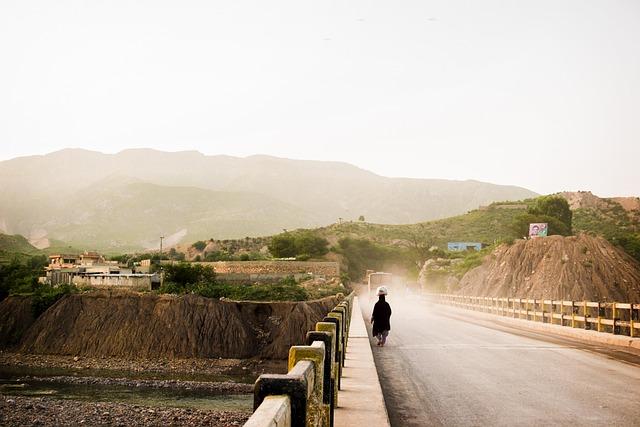In the vast tapestry of South Asia, where cultural legacies intertwine and geopolitical currents ebb and flow, Pakistan stands as both a cornerstone and a fulcrum of regional stability. Nestled between towering mountains and vibrant plains, this nation has long been a pivotal player on the chessboard of international relations. As the tides of history have shifted, Pakistan’s strategic decisions and diplomatic endeavors have not only shaped its own trajectory but have reverberated across borders, influencing the dynamics of neighboring countries. This article delves into the multifaceted role Pakistan plays in fostering regional stability, examining its relationships with key players, its ongoing challenges, and its aspirations for a peaceful coexistence in a region marked by complexity and change. Join us as we navigate the intricate landscape of Pakistan’s influence, exploring how it continues to contribute to the delicate balance of power in South Asia.
Exploring Historical Context and Regional Dynamics
The historical interplay between Pakistan and its neighboring countries has significantly influenced regional stability. Following the partition in 1947, the political landscape of South Asia underwent a dramatic transformation, leading to territorial disputes, primarily over Kashmir. This conflict has not only strained Pakistan’s relations with India but also affected its engagement with Afghanistan and China, each driven by their geopolitical interests. As a result, regional dynamics have often been characterized by alliances and enmities, compelling Pakistan to navigate a complex web of international relations.
To further understand Pakistan’s pivotal role, it is essential to consider the strategic partnerships it has forged to enhance regional stability. The China-Pakistan Economic Corridor (CPEC) serves as a cornerstone in this regard, aiming to bolster economic ties through infrastructure investments. Additionally, with the rise of radicalism and terrorist groups, Pakistan’s military and diplomatic strategies have evolved to address these threats. The table below illustrates key historical events that have shaped the dynamics of Pakistan’s relations with its neighbors:
| Year | Event | Impact on Regional Relations |
|---|---|---|
| 1947 | Partition of British India | Creation of India & Pakistan, sparking immediate conflicts. |
| 1971 | Bangladesh Liberation War | Strained relations with India after the loss of East Pakistan. |
| 2015 | Launch of CPEC | Strengthened ties with China, economic opportunities for Pakistan. |

Evaluating Pakistans Diplomatic Engagement in South Asia
Pakistan’s diplomatic engagement in South Asia has been pivotal in navigating the complexities of its relationships with neighboring countries. Through a blend of strategic alliances, regional cooperation frameworks, and multilateral dialogues, Islamabad seeks to enhance stability while addressing its national interests. Key aspects of this engagement include:
- Regional Security Dialogues: Active participation in discussions aimed at countering terrorism and insurgency.
- Economic Diplomacy: Furthering trade agreements and investment initiatives with countries like India, Afghanistan, and Iran.
- Cultural Exchanges: Promoting people-to-people contacts and cultural diplomacy to foster mutual understanding.
Such diplomatic efforts are not without challenges. The historical tensions with India over Kashmir continue to obstruct collaborative initiatives, while domestic political instability often hampers coherent foreign policy direction. Moreover, as China and India vie for influence in the region, Pakistan finds itself balancing its partnerships in ways that could shift power dynamics. The following table summarizes the major diplomatic initiatives undertaken by Pakistan in recent years:
| Initiative | Year Launched | Objectives |
|---|---|---|
| South Asian Association for Regional Cooperation (SAARC) | 1985 | Promote economic and regional integration. |
| China-Pakistan Economic Corridor (CPEC) | 2015 | Enhance trade and connectivity. |
| Afghan Peace Process | 2020 | Support a stable Afghanistan for regional peace. |

Strengthening Economic Ties for Sustainable Peace
In the intricate tapestry of regional stability, economic collaboration emerges as a fundamental thread. Pakistan, strategically positioned at the crossroads of South Asia and Central Asia, holds a pivotal role in fostering economic interdependence among neighboring countries. By establishing bilateral trade agreements and regional partnerships, the nation can not only boost its own economy but also contribute to a more resilient and interconnected region. Efforts such as the China-Pakistan Economic Corridor (CPEC) exemplify how infrastructure development can spur economic growth, paving the way for enhanced cooperation with other nations. The ripple effect of such initiatives can lead to improved trade routes, access to resources, and shared technologies, which collectively support sustainable development.
Moreover, it is essential to cultivate an environment that promotes cross-border investments and joint ventures, thereby facilitating the flow of capital and innovation across regions. Engaging in regional forums and trade blocs can further amplify these efforts, allowing Pakistan to serve as a catalyst for dialogue and partnership. For instance, collaborative projects in areas such as agriculture, energy, and technology can harness each nation’s strengths, creating a symbiotic relationship that enhances economic resilience. This cooperative spirit not only mitigates tensions but also fosters a culture of shared prosperity, ultimately underpinning a more peaceful and stable regional landscape.

Fostering Collaborative Security Initiatives for Stability
In the complex web of regional geopolitics, a proactive approach to security is essential for all stakeholders involved. Pakistan, with its strategic location and historical ties, plays a pivotal role in encouraging collaborative security initiatives aimed at fostering stability. By engaging in partnerships with neighboring countries and global powers, Pakistan can facilitate dialogue and promote joint efforts to combat common threats such as terrorism, drug trafficking, and cyber warfare. Collaborative mechanisms such as joint military exercises, intelligence sharing, and development programs are vital for building trust and ensuring a unified stance against destabilizing forces.
To effectively enhance regional stability, Pakistan should prioritize the following initiatives:
- Regional Security Dialogues: Hosting forums that focus on collective security challenges can establish a framework for ongoing discussions.
- Joint Development Projects: Investing in infrastructure and economic collaborations can lead to shared interests that transcend political boundaries.
- Training and Capacity Building: Engaging in cross-border training programs enhances not only military readiness but also promotes cultural understanding among forces.
Through these efforts, Pakistan can not only contribute to regional peace but also solidify its position as a key player in the evolving security landscape.
Closing Remarks
As we close this exploration of Pakistan’s pivotal role in shaping regional stability, it becomes evident that the nation’s influence extends far beyond its borders. Positioned at the crossroads of South Asia, Central Asia, and the Middle East, Pakistan stands as a key player, navigating a complex web of geopolitical interests, historical relationships, and emerging challenges.
The intricate dance of diplomacy and security that Pakistan engages in reveals a tapestry woven with both opportunities and obstacles. While its contributions to regional peace are often overshadowed by the turbulence that occasionally grips the area, the country remains a vital advocate for dialogue and cooperation.
In a world where stability is increasingly elusive, understanding Pakistan’s position and actions provides essential insights into future developments. As the region continues to evolve, so too will Pakistan’s strategies and alliances, reflecting its commitment to fostering a peaceful and prosperous neighborhood.
Thus, the journey to regional stability is not solely a tale of individual nations but a collective narrative in which Pakistan plays a significant, albeit often underappreciated, role. Moving forward, it will be crucial for all stakeholders to acknowledge and engage with this reality, for the stability of one is inevitably tied to the serenity of the whole. As we ponder the prospects of this dynamic region, let us remain aware that the path to peace is paved with understanding, cooperation, and the persistent will to persevere through challenges.



